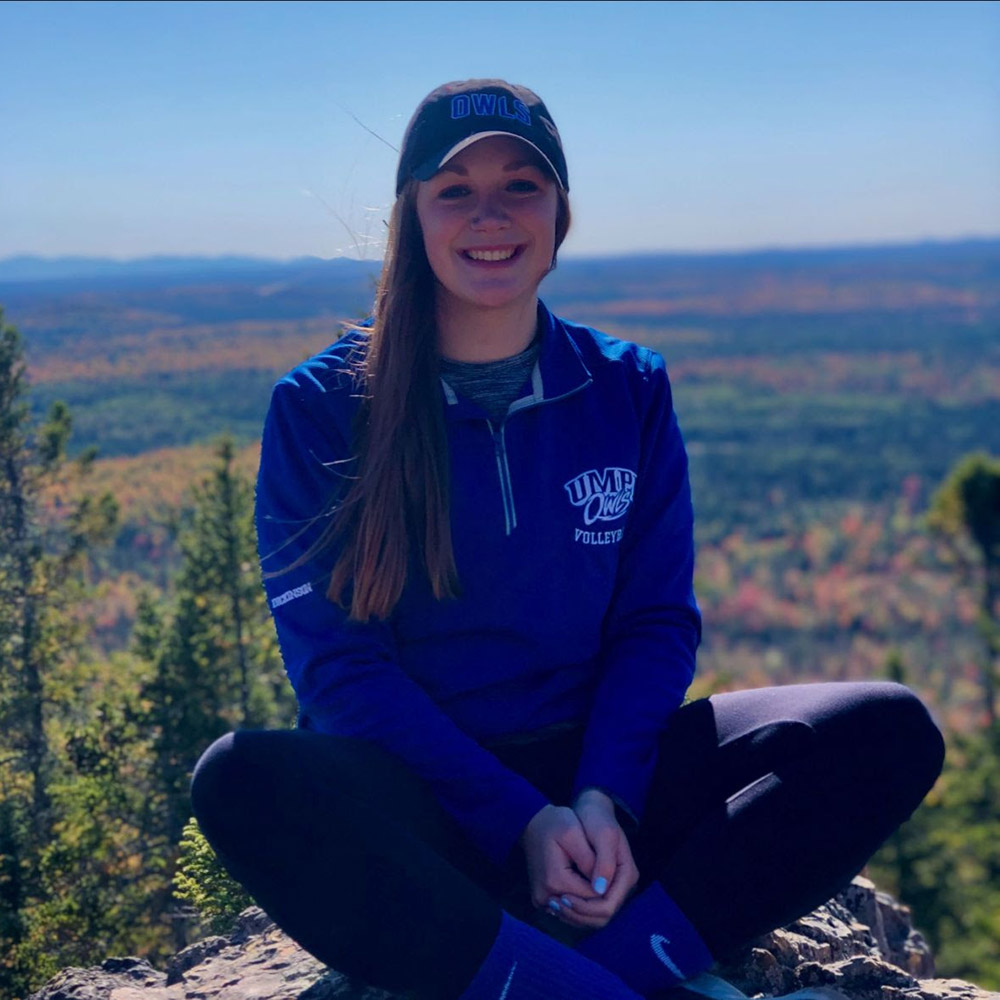By Melanee Terry

College students across the country, including Marge Dickinson, have spent the last months adapting to a new style of education due to the COVID-19 pandemic. As a senior Education Major with a concentration in Special Education, Marge has been challenged in many different ways, including how to get her student teaching done. Marge is an active student on campus and has had many aspects of her college life restricted. These past months have been difficult for everyone, but despite these challenges, students like her are persevering through such tough times.
She would be the first to tell you that living in the dorms on campus has been different this fall. With many things closed and restricted on campus, Marge is unable to meet up and socialize like she usually does with friends. As a friendly individual, she usually leaves her door open in the dorm for anyone passing by, but that is not allowed without a mask on. The Kelley Commons cafeteria has also played a big role in students’ socialization. The cafeteria is using a take-out system, therefore, students are not allowed to sit in groups and eat together.
“I would say everything feels a little more tense and everyone seems to be a little on edge, but we are all doing our best to keep spirits up in this new normal,” Marge said. “The buzz of hopping class to class or eating together in the cafeteria no longer exists in a take-out system and with so many classes being online.”
After living on campus for the past three years, Marge has gotten to know many staff and faculty members. This pandemic has not only been difficult for students, but everyone involved on campus. Faculty and staff members have all been very understanding and flexible. They are empathizing with students and doing everything in their power to help them out.
“I think COVID has touched everyone in some way, but educators especially,” Marge said. “Every professor cares deeply about their students and their success and not being able to directly reach them or see them every day is difficult.”
Like many students, Marge prefers in-person classes, though having to socially distance and wear a mask in class is something no one is used to. She was able to quickly adapt to online classes because of her Special Education concentration. Students with this concentration have been taking their classes online through the University of Maine at Machias for a couple of years now. One of the biggest disadvantages to having online classes that she sees is the lack of connections between classmates. Group work is much more difficult when it is virtual.
“Masks are not my favorite thing, but I understand the necessity of them in the classrooms so I bought a handful of really cool ones so I’d want to wear them out and about,” Marge said. “You have everything right at your fingertips and it is a lot easier to ask real time questions and get feedback and learn from organic discussions, rather than the forced discussion board postings.”
Education majors are required to complete observation and student teaching hours and, with COVID-19, Marge and her fellow classmates have been forced to change the way they do this. Marge lives downstate where they are not letting any outsiders into the schools. Completing her hours in Aroostook County was her only chance to physically get into a school to work with kids. A couple days of observations were postponed, so she has been working behind schedule.
“I know a few of my peers were not able to find placement within a school and have been teaching and observing remotely which makes it hard to make those connections with the students,” Marge said.
Many education students are now working hard to get their hours in. If there is a spike in cases, schools in the area may be shut down and in-person observation opportunities could be affected. While the Education program has plans in place to provide quality alternatives if that happens and has prepared students to be leaders in using educational technology to support teaching and learning, that concern over school shut-downs has been front of mind for students.
“The worst thing has been fear of the unknown. For a while we did not know if we were coming back to school or if everything was going to be online,” Marge said. “ There is a renewed appreciation of being here in person, but also still the fear that it could all change at any time.”
A good way to stay positive and relieve stress is to socialize, but that is much different now. Marge calls home to her family very often. She has been getting outside more and enjoying the weather. Every weekend this past summer, she went hiking or traveled to the beach to get some fresh air. Like everyone else, she has been trying to find new things to occupy her time in this new normal.
“One of the first things I did upon coming back to campus was to get a small group together and hike Haystack Mountain,” Marge said. “I really think that getting off campus and getting that fresh air has really helped me to stay positive and optimistic about getting back to normal.”
Adapting to a world of COVID-19 has been challenging for all students, but Marge seems to have found her clarity.
“I think that this whole ordeal has really helped me take a look at what is important in life and gain more of an appreciation for the things that I had previously taken for granted,” she said. “I hope to keep this lesson in mind and keep on appreciating the small things because they are never guaranteed.”